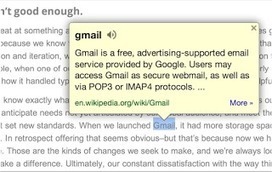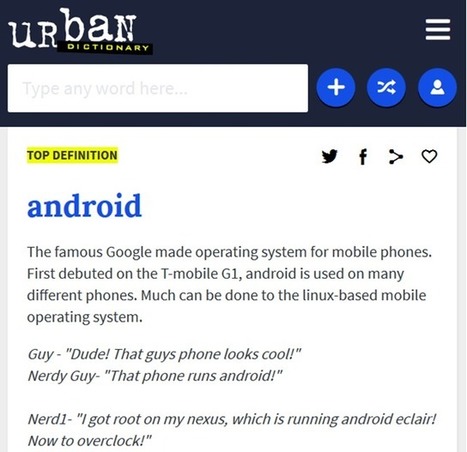
|
Scooped by Tom D'Amico (@TDOttawa) |
Get Started for FREE
Sign up with Facebook Sign up with X
I don't have a Facebook or a X account
 Your new post is loading... Your new post is loading...
 Your new post is loading... Your new post is loading...
Makayla Matheu's curator insight,
March 7, 2016 3:32 PM
This article stood out to me because it shows you what a word means. I know at times I write down a word but I really don't know what it means. These three online dictionaries now provide that information to many students. Students have the opportunity to discover new words and substitutes for those words. I know I struggle with wanting to use a different word in my essays. You just double click or highlight the word and the word shows up with a full discription of the word. If you wish to use a different word you can click on the more button for a thesauraus or other things. This is a great way for students to learn new words and understand words. This is also a great method to improve students reading skills. Even in the definition of a word, there may be words you don't understand. All you have to do is look up that word the same way you discovered the previous word. This improves reading skills for many students of all generations and an improvement in writing as well.
Sign up to comment

Michelle Franco's curator insight,
December 10, 2014 4:20 PM
This article discusses the benefits of using the Internet instead of the traditional dictionary.
The Internet has taken resources that have been used for years to a whole new level. Before the Internet, when someone needed to find the definition of a word, check the spelling of a word, attempt to pronounce a word, he or she would use a dictionary. The Internet provides a lot more information for each word than a traditional dictionary, which is limited. There are many links available to see more examples and other ways to define the same word. Going online also enables one to click and listen to the correct pronunciation of a word with the option of it being read to the person instead of reading and attempting to sound it out. Images are also provided when searched for online. It is also a lot more convenience to have access to a dictionary without having to carry a traditional dictionary. Mobile devices such as smartphones and tablets provide people with access to the Internet wherever they go. This means that there is access to the dictionary online. Also, you can type in a word rather than look through pages and alphabetically search for a word one by one. Traditional methods of finding a word can be difficult and frustrating when one does not know the correct spelling. Online attempts to spell a word immediately offer suggestions that can lead you to the word you are searching for. Overall, students and teachers in today’s technology age use traditional dictionaries less, due to the benefits provided by the dictionaries on the Internet. |
|












